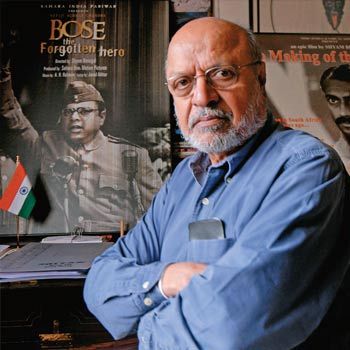 | « Back to article | Print this article |

'If we are capable of changing governments on the basis of our votes, we know what’s good for us. Why can’t we decide what is good for us to watch in the cinema?'
Veteran filmmaker Shyam Benegal discusses censorship in Indian cinema.
The eminent Shyam Benegal is no stranger to positions of responsibility within the film industry.
He has now been appointed to head a panel that will provide recommendations to better the working of the Censor Board Of Film Certification (CBFC).
In this conversation with Subhash K Jha, the filmmaker reveals what ails the censor board.
The CBFC seems mired in controversies. No matter what it does, there is criticism. Your comment?
The tragedy of censorship in our country is that personal biases and prejudices often come in the way of evaluating films for the Indian audience. As you know, the Indian audience is extremely diverse. You can’t really categorise them and say, ‘This is your audience’.
You can never tell the gap between the urban and non-urban, the metropolitan and non-metropolitan audience... the guidelines of the censor board are too rigid to be applied to this diverse audience.
So what is the solution?
There should be a basic guideline about whether a film has used obscenity in terms of speech, behaviour or gesture. Or in terms of the situation created by the script.
Now, whether these situations are actually awkward or embarrassing for the average moviegoer or whether it affects the audience in a way that’s socially harmful -- and this is where the depiction of sex and nudity comes in -- is a moot point.
On the other hand, you have the use of violence. It has to be determined if the use of violence is much too horrific and intense and does it dull your audiences’ sensibilities towards violence.
So how does one determine whether the obscenity and violence are actually detrimental to society?
That is the problem.
These are not things that one can sit down in judgement over easily. This is where we need to address the question of how much philosophical, psychological and sociological know-how is possessed by members of the censor board, and in the current scenario, by the chairman of the censor board.
What is your opinion on that?
Does the censor come in the way of your film or is it of any help? There may be themes and situations in films that could influence impressionable minds.
It is up to the filmmaker to be mindful of those situations. I’d rather have the filmmakers themselves exercise restrain in their expression. You cannot stop people from making the film they want to.
So the onus of censorship should be on the filmmakers?
It’s a very difficult responsibility. Because at the end of the day, cinema is a commercial business. Audiences have to be drawn in to recover investment. It’s a complex situation. But one thing is for certain: the government is not going to get rid of the censor board any time soon.
I think the need for a censor board should not be there, particularly in a democracy. If we are capable of changing governments on the basis of our votes, we know what’s good for us. Why can’t we decide what is good for us to watch in the cinema?
You mean self-censorship?
I would rather have gradation rather than censorship whereby audiences are told that a film may not be suitable for someone below 16 or 18, that it may be suitable for a more mature audience.
Rather than using scissors, audiences should be told that certain films with violence or sex may not be suitable for children. Why cut up a film? Britain allows its audience to make up its mind about what to see. The idea of using scissors to cut up a filmmaker’s work is a disturbing one.
Have you faced censorship issues with your films?
Oh yes.
Nishant was cut. There was a scene of Anant Nag and a girl making love behind a tree. They wanted it cut, so we cut it. Some filmmakers applied a strange logic to get their love making scenes passed. They put so much of sex in a scene that even after the censor board would ask to cut it, there was some left.
It was sad and nonsensical logic.
My Bhumika was snipped.
In Manthan, there were two cuts. Otherwise, they would have given me an ‘A’ certificate. One cut was where Girish Karnad was explaining artificial insemination in cattle. These cuts never made any sense to me.
In recent years, I’ve had no problems. Maybe because my recent films are more satirical.
But you accepted these cuts?
I wouldn’t have but my producers did. It was their money. I didn’t want any trouble, so I gave up.